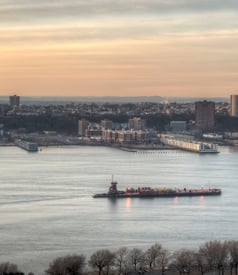New Jersey lawmakers advanced legislation last week that would make their state the first to ban the controversial and largely unregulated practice of hydraulic fracturing, aka “fracking,” used to drill for natural gas. The New Jersey Senate Environment Committee approved the legislation amid a public debate over proposed regulations for an estimated 10,000 fracking wells that could soon be established in the Delaware River Basin.
The bill to permanently ban fracking in New Jersey is the first of its kind, but a growing grassroots movement against fracking has already won victories in city halls across the country as the public responds to mounting evidence that fracking operations are contaminating water supplies.
Fracking is the process of injecting millions of gallons of water and chemicals – some of them toxic – into underground formations to split up rock and release natural gas. The language in the New Jersey bill echoes the fears of fracking’s hardcore critics, including the industry’s unwillingness to reveal the chemicals included in fracking liquids and the now infamous June 3 blowout of a fracking well that spewed potentially explosive gas and 35,000 gallons of contaminated water in Clearfield County, Pennsylvania.
The natural gas-rich Marcellus Shale, an underground geological formation stretching across most of Pennsylvania and New York, has become a central battleground in the fracking debate as the industry rushes to exploit vast reserves of cheap domestic fuel. At least 1,500 fracking wells are currently producing gas in Pennsylvania, but last year, protests and a grassroots campaign in New York pressured lawmakers to put a moratorium on fracking to give state regulators time to assess potential environmental impacts. The moratorium expires on May 15.
Now, the fracking industry is targeting a portion of the Marcellus Shale that underlies 36 percent of the Delaware River Basin, a vast watershed that provides water to 15 million people in New York, Delaware, Pennsylvania and New Jersey. The Delaware River Basin Commission (DRBC), an agency with representatives from all four states, has proposed a set of regulations for the 10,000 wells the DRBC estimates could be developed in the basin. That many wells would require 15 to 19 million gallons of water a day to operate, and much of the water would be sucked up from local sources.
The commission could approve the regulations – and declare open season for fracking the Delaware River Basin – as early as April.
Hundreds of people attended public meetings on the proposed regulations. Critics argue that the regulations are not strong enough to control wastewater from fracking and the practice itself should be banned in the region, while supporters say fracking will create jobs and stimulate economic growth.
With the approval of regulations for fracking operations in sight, citizens in small towns in the Delaware River Basin and beyond are pushing local councils to join a growing list of municipalities that have banned fracking.
Local bans are considered mostly symbolic gestures, but they send a strong message when coupled with well-publicized bans recently passed in Pittsburgh, Pennsylvania and Buffalo, New York, where city councils banned fracking after protests and local campaigns pushed city leaders to take action.
Jim Walsh, a fracking critic with the watchdog group Food and Water Watch, said he is impressed by the number of local citizens who have come together to oppose fracking in the Delaware River Basin and beyond without prodding from national environmental groups.
“I’ve worked on campaigns like this for years, and I’ve never seen anything come together like this,” Walsh said. “It’s a lot of different people coming together to keep [fracking] out of their communities.”
Walsh said that people get really “excited” when it comes to protecting their environment and drinking water. State leaders are listening, at least in New Jersey, where 39 state legislators foreshadowed the proposed ban last month with a letter to the DRBC asking the commission to wait on approving regulations until the Environmental Protection Agency (EPA) completes a comprehensive review of the environmental impacts of fracking. The letter contends that the proposed regulations are too premature to be based on sound science.
The EPA began a comprehensive review of fracking last year after public outcry prompted the agency to reconsider a 2004 report that showed fracking did not pose a threat to the water supply. The 2004 report prompted Congress to exempt fracking from regulation under the Clean Water Act and gave the green light for thousands of fracking wells to be established with little federal oversight. The results of the current EPA study are expected next year.
Matching Opportunity Extended: Please support Truthout today!
Our end-of-year fundraiser is over, but our donation matching opportunity has been extended! Today, all donations to Truthout will be matched dollar for dollar. Your one-time gift today will be matched immediately. As well, your monthly donation will be matched for the whole first year, doubling your impact.
This matching gift comes at a critical time. Trump has made it no secret that he is planning a demolition-style attack on both specific communities and democracy as a whole, beginning on his first day in office.
Help us prepare for Trump’s Day One, and have your donation matched today!
